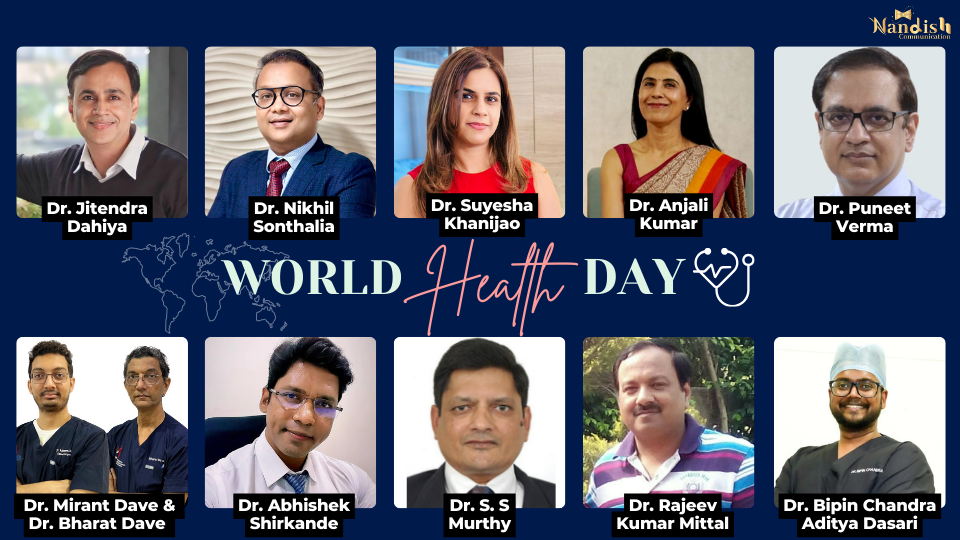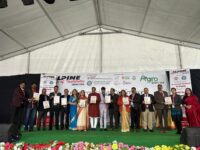Insights from Leading Health Experts on World Health Day 2024: My Health, My Right

New Delhi (India), April 6: As the world celebrates World Health Day 2024, the theme “My Health, My Right” resonates profoundly in our collective consciousness. In this article, we delve into insights from esteemed health experts, shedding light on the critical importance of health as a fundamental human right. From mental health advocacy to tackling neurological diseases, these experts offer invaluable perspectives on addressing the multifaceted challenges that impact global well-being. Join us on this journey as we explore key issues, initiatives, and collaborative efforts aimed at empowering individuals to claim their right to optimal health and fostering a healthier, more equitable world for all.
Dr. Puneet K Verma, Chief Interventional Cardiologist cum Structural Heart Specialist, Ace Heart and Vascular Institute, Mohali
As an interventional cardiologist, I have spent years witnessing the consequences of neglecting one’s health. On this World Health Day, I join millions of experts and healthcare professionals worldwide in spreading the message that “My Health is My Right.” Having good health is not just a privilege; it is a fundamental human right. It is crucial for individuals to take charge of their health by adopting healthy lifestyles. This includes maintaining a balanced diet, engaging in regular physical activity, managing stress, and avoiding harmful habits like smoking or excessive alcohol consumption. Moreover, it is imperative for governments and societies to invest in healthcare infrastructure, ensure accessibility to essential services, promote health education, and prioritize preventive care. Prevention is undeniably better than cure. Regular health check-ups, screenings, and early intervention can prevent many diseases from reaching advanced stages. By recognizing and respecting the right to good health, we can build a healthier, happier, and more resilient society.
Dr. Nikhil Sonthalia, MD, DM, FASGE (USA), MNAMS, Senior Consultant Gastroenterologist, Apollo Multispeciality Hospital, Kolkata
On World Health Day, it’s crucial to reaffirm every individual’s universal right to health, encapsulated in “My Health, My Right.” As a Senior Consultant Gastroenterologist at Apollo Multispeciality Hospital, Kolkata, I advocate for spreading awareness and ensuring equitable access to healthcare for all. In my role, I emphasize preventive measures for common GI issues like peptic ulcer disease, pancreatitis, diarrhea, and hepatitis, alongside early detection of gastrointestinal malignancies such as stomach and colon cancer. Additionally, I provide accessible treatment options, including various endoscopic interventions, for gastrointestinal health concerns like bleeding, jaundice, and obstructions. Through awareness and education, individuals are empowered to make informed decisions and take control of their health. On this World Health Day, I aim to raise awareness about common GI symptoms like pain in abdomen, weight loss, vomiting, jaundice, requiring immediate evaluation and treatment by healthcare specialists, as timely diagnosis and intervention can significantly impact outcomes. By prioritizing health education and rights, we can cultivate a culture of inclusivity and empowerment, building a healthier, more resilient society where everyone can thrive. Join me in championing health equity and access for all.
Dr. S. S. Murthy, MBBS, DNB, MNAMS, Director & HOD – Cardiology, Ayushman Hospital, New Delhi
World Health Day 2024’s theme, ‘My health, my right’, underscores the urgent need to ensure universal access to quality health services and essential amenities. Despite health being recognized as a human right in the constitutions of over 140 countries, more than half of the global population lacks comprehensive health coverage. This year’s focus aims to champion the right of all individuals to accessible healthcare, education, clean water, sanitation, and environmental conditions free from discrimination. Governments are expected to prioritize affordable healthcare and insurance, implement measures to curb industrial pollution, preserve natural resources, and promote renewable energy sources. To lead a healthy life, individuals are advised to maintain a balanced diet, regular exercise, sufficient sleep, stress management, and avoidance of harmful habits like smoking and excessive alcohol consumption. By upholding these principles, we can collectively strive towards safeguarding the right to health for present and future generations.
Dr. Anjali Kumar, Senior Consultant Gynaecologis tand Obstetrician, Founder of Maitri Woman, Gurgaon
As a highly experienced gynecologist with over 35 years of practice and a deep commitment to patient-centered care, I founded Maitri to serve as a warm haven for trustworthy information on women’s health. Throughout my career, I’ve delivered over 18,000 babies and performed over 7,000 complex surgeries, underscoring my dedication to women’s well-being. At Maitri, our mission is clear: to empower women with authentic, non-judgmental, and medically verified insights on crucial topics like safe sex, contraception, pregnancy, PCOS, and menopause. We aim to provide easy-to-understand explanations and dispel common myths, allowing women to make informed decisions about their health. With over 8 lakh subscribers and 80,000 Instagram followers, along with recognition from prestigious organizations like WHO Fides and BMGFindia, supported by the Bill and Melinda Gates Foundation, Maitri’s global impact is evident. From menarche to menopause, Maitri stands by women, offering unwavering support and guidance on their unique health journeys. On this occasion of World Health Day, I want to remind everyone that health is a fundamental right, and knowledge about your health is essential. Subscribe to Maitri Woman’s YouTube channel to access reliable and easy-to-understand information, empowering you to take charge of your well-being..
Dr. Suyesha Khanijao, IVF expert, Cosmetic Gynecologist, Laparoscopic Surgeon , Obstetrician and Gynaecologist at Angel’s Hope, Sawan Neelu Angel’s Hospital, New Delhi
Dr. Suyesha Khanijao, Director of Angels’ Hope at Sawan Neelu Angels Hospital specialize in the management of infertility, reproductive health and fertility treatments including oocyte preservation. I have always emphasized on importance of social egg freezing for various reasons, to give one the best chance in conceiving with own gametes when one wants. I assert that health is an inherent right for every individual. On World Health Day 2024, it’s crucial to highlight the significance of accessible reproductive healthcare services, including advanced options like egg preservation. Reproductive health encompasses not only fertility treatments but also the right to make informed choices about one’s reproductive journey. Egg preservation offers individuals the opportunity to safeguard their fertility for the future, empowering them to pursue parenthood on their terms. It’s imperative to advocate for inclusive reproductive health policies and ensure that fertility preservation options are accessible to all, regardless of gender, sexuality, or socio-economic status. By prioritizing comprehensive reproductive healthcare, we uphold the principle that everyone deserves the chance to build the family they desire while promoting overall health and well-being. Let us stand together in support of reproductive rights and equitable access to fertility preservation services.
Dr. Jitendra Dahiya, BDS, COI, C. Ortho., Senior Dental Surgeon, Certified Orthodontist and Implantologist, Pooja Dental Clinic, Delhi
In today’s fast-paced world, amidst the allure of material wealth and societal pressures, it’s easy to overlook the invaluable treasure that is our health. Yet, without good health, all the riches and achievements we amass become futile. Our well-being is not merely a privilege but a fundamental birthright, essential for savoring life’s experiences to the fullest. Modern lifestyles, characterized by relentless work hours, heightened stress levels, and an incessant pursuit of societal expectations, often lead us astray from prioritizing our health. We find ourselves ensnared in the complexities of a digitally-driven society, succumbing to the allure of constant comparison and unrealistic standards propagated by social media. In this pursuit of fleeting pleasures and societal validation, we neglect the simpler joys of existence and detach ourselves from the nurturing embrace of nature. We must rekindle the wisdom of our forebearers, embracing a lifestyle rooted in simplicity and mindfulness. By fostering a culture of holistic well-being, starting from childhood, we can instil in future generations the values of balance, self-care, and reverence for both our bodies and the natural world. Let us reclaim our right to good health and cherish it as the cornerstone of a truly fulfilling life.
Dr. Rajeev Kumar Mittal, MBBS, DCH (Lucknow), PGPN (Boston University) – Sanjivani Medical Center, Meerut
Around the world, the right to health of millions is increasingly coming under threat. Diseases and disasters are increasing in pace to causes of death and disability. Conflicts are destroying a lot of lives, causing death, pain, hunger and psychological distress. The burning of trees as fuels is simultaneously causing climate changes and taking away our right to breathe clean air, with indoor and outdoor air pollution causing death every 5 seconds. The WHO Council on the Economics of Health for All has found that at least 140 countries recognize health as a human right in their constitution. Yet countries are not passing and putting into practice laws to ensure their populations are entitled to access health services. This underpins the fact that more than half of the world’s population — was not fully covered by essential health services in 2021. To address these types of challenges, the theme for World Health Day 2024 is ‘My health, my right’. This year’s theme was chosen to champion the right of everyone, everywhere to have access to quality health services, education, and information, as well as safe drinking water, clean air, good nutrition, quality housing, decent working and environmental conditions, and freedom from discrimination. There is no place for discrimination, racism and inequality in healthcare.
Dr. Abhishek K. Shirkande, DNB Nephrology MD Medicine, Gold Medalist, Consultant Nephrologist & Kidney Transplant Physician, S.L. Raheja-Fortis Hospital, K.J. Somaiya Hospital, Holy Family Hospital, Mumbai
Kidneys are vital organs that filter waste from the blood and excess water from the body and have other functions. Left untreated, CKD, a form of kidney failure, allows toxins to build up in the body and can lead to other health problems, like heart disease and stroke. It also can progress to end-stage renal disease, which requires dialysis or kidney transplant. Unfortunately, the symptoms of kidney disease aren’t always noticeable, and 40-50% of people with severely reduced kidney function are not aware they have CKD. Risk factors of CKD include diabetes, high blood pressure, obesity, heart disease, family history of kidney disease and advanced age. So its recommended to do annual physical check-ups, blood and urinalysis tests. I recommend a kidney-friendly diet which is low in sodium and carbohydrates and includes lots of fruits and vegetables that help protect your kidneys from the risk factors that can lead to kidney damage. Additionally, incorporating 30 minutes of exercise each day, such as walking, jogging and biking, among other activities can also keep your kidneys healthy. Other ways to protect your kidneys include drinking plenty of water and avoiding smoking and alcohol. Don’t overuse over-the-counter drugs especially Nonsteroidal anti-inflammatory drugs (NSAIDs) which are a specific group of painkillers that may cause an increased risk of sudden kidney failure and progressive kidney damage.
Dr. Bharat Dave & Dr Mirant Dave, Orthopedic Spine Surgeons at Stavya Spine Hospital & Research Institute, Ahmedabad
This World Health Day, we spotlight the dynamic father-son duo, Dr. Bharat Dave and Dr. Mirant Dave, whose work in orthopedic spine surgery is revolutionizing patient care. Dr. Mirant, known for his outstanding skills in minimally invasive spine surgeries, leverages the latest technologies to ensure faster recoveries and minimal discomfort for his patients. His innovative approach not only sets new benchmarks in surgical precision but also reflects a deep commitment to advancing spinal health. Dr. Bharat Dave, with his extensive experience and wisdom in orthopedic surgery, has been a cornerstone in the field. His mentorship and expertise have been instrumental in shaping the future of spinal treatments. Together, they combine the best of innovation and experience, offering patients cutting-edge, compassionate care. Their collaboration exemplifies the perfect marriage of traditional medical wisdom with modern surgical innovations. On World Health Day, the contributions of The Dave Surgeons to spine surgery remind us of the power of combined generational knowledge and the continuous pursuit of excellence in medical science.
Dr. Bipin Chandra Aditya Dasari, Interventional Cardiologist at Rhythm Heart Institute, Vadodara
Dr. Bipin Chandra Aditya Dasari, Interventional Cardiologist at Rhythm Heart Institute, Vadodra, emphasizes that health is not just a privilege, but a fundamental human right. On World Health Day 2024, let us reaffirm our commitment to ensuring equitable access to quality healthcare for all. Prevention is always better than cure, Dr. Bipin asserts. Through education and proactive health management, individuals can be empowered to take charge of their well-being, ultimately reducing the burden of cardiovascular diseases and promoting a healthier society. Dr. Bipin underscores the importance of prioritizing heart health in today’s fast-paced world. By adopting healthy lifestyle choices, such as regular exercise, balanced diet, and stress management, the risk of heart disease can be significantly lowered, enhancing overall quality of life. Every heartbeat matters, Dr. Bipin emphasizes. On this World Health Day, he advocates for increased awareness, early detection, and prompt intervention in cardiovascular health, paving the way for a future where heart diseases are preventable and treatable for all. Healthcare should be inclusive and accessible to everyone, Dr. Bipin insists, regardless of their socioeconomic status or geographic location. By bridging the gaps in healthcare infrastructure and promoting health equity, we can move closer to achieving the goal of ‘health for all’.
This article is compiled by Nandish Communication. For any query, please contact at +91-9873359807
If you have any objection to this press release content, kindly contact pr.error.rectification@gmail.com to notify us. We will respond and rectify the situation in the next 24 hours.

Atul Tiwari is a seasoned journalist at Mumbai Times, specializing in city news, culture, and human-interest stories. With a knack for uncovering compelling narratives, Atul brings Mumbai’s vibrant spirit to life through his writing.





